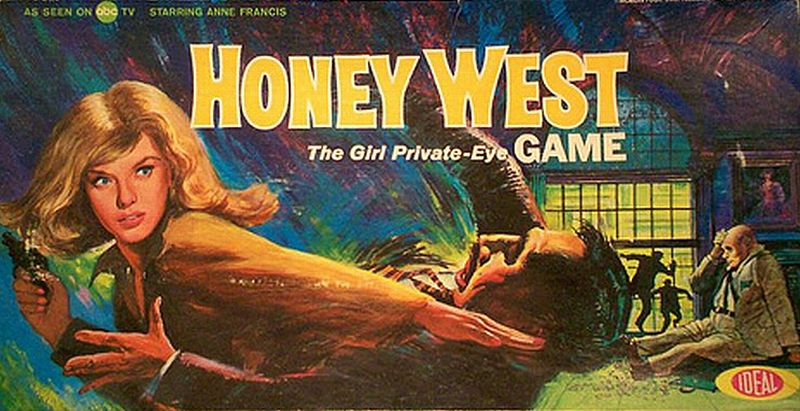 ★★★★
★★★★
“A taste of Honey.”

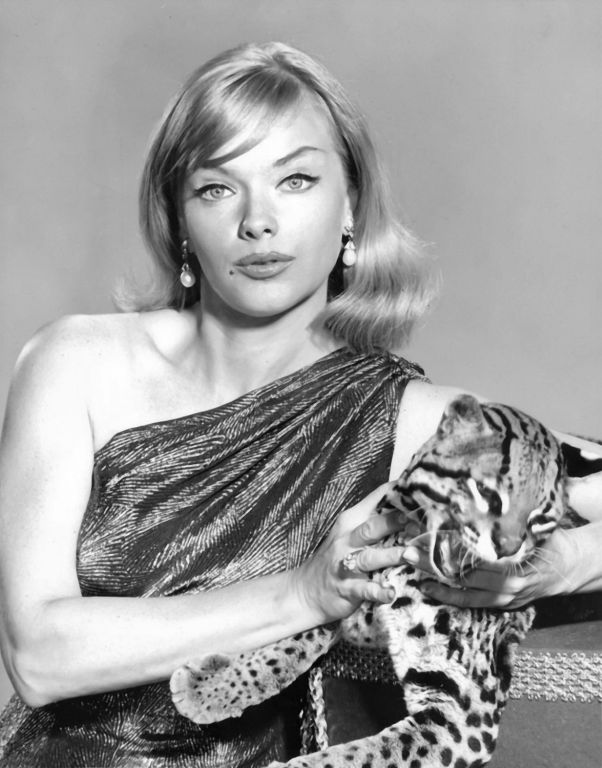 Honey West’s significance in television history can’t be exaggerated. She was the first ever woman detective to be the central character in an American network series, and was arguably the medium’s first action-heroine. Even though it ran for just one season, it helped open the doors for those who followed, such as The Girl from U.N.C.L.E., Get Christie Love and Police Woman. The show was based on a series of books by husband-and-wife team Gloria and Forrest Fickling, writing as “G.G.Fickling”. Beginning in 1957 with This Girl For Hire, eleven novels were produced over the next half-decade, and noted producer Aaron Spelling bought the rights and turned it into a TV series, originally spinning off from Burke’s Law [Gloria Fickling states they were largely screwed over by Spelling, getting little beyond a credit].
Honey West’s significance in television history can’t be exaggerated. She was the first ever woman detective to be the central character in an American network series, and was arguably the medium’s first action-heroine. Even though it ran for just one season, it helped open the doors for those who followed, such as The Girl from U.N.C.L.E., Get Christie Love and Police Woman. The show was based on a series of books by husband-and-wife team Gloria and Forrest Fickling, writing as “G.G.Fickling”. Beginning in 1957 with This Girl For Hire, eleven novels were produced over the next half-decade, and noted producer Aaron Spelling bought the rights and turned it into a TV series, originally spinning off from Burke’s Law [Gloria Fickling states they were largely screwed over by Spelling, getting little beyond a credit].
Naturally, this being the mid-sixties, the racier elements of the pulp novels had to be toned down, but the presence of Forbidden Planet star Anne Francis added its own share of potential, especially to boys of the appropriate age, which according to Francis, included Oliver Stone. But she was just as fascinating to young girls. It’s hard to appreciate in a world of Rizzoli and Isles, Prime Suspect, etc, that this presented a character which had never been seen on television. Fans included Chris, who even used to have the Honey West doll – given it now is offered on Ebay for up to $250, she wishes she had kept it, in the original box and with all its accessories.
How does the show stand up, almost fifty years later? Firstly, you have to appreciate that…well, it’s fifty years later. Most obviously, this shows in that the action is basically woeful, by modern standards. Honey’s karate skills extend little beyond flipping people on to their back, with the odd chop – and, it appears, in the sixties, everyone had a spot on their neck which would trigger immediate unconsciousness when touched. The doubling, is often painfully obviously a man in a blonde wig, though frequent stand-in (and early MMA practitioner) Gene LeBell does have decent legs. Credit in this area for the later episodes to Sharon Lucas, another stunt-double, and we should be fair and point out that no show from the time could stand against modern era in terms of action.
The unofficial lyrics
“Honey West, she’s a P.I. – for real…
Karate and judo, amazing contraptions,
gadgets, a sports car, and the latest fashions.
Plus… She… Has… Got… An… Oh… Ce… Lot!
But she’s smart, and she’s sexy,
Though her partner’s a little bit bitchy.
So that’s why we love Honey West!
(For real). |
In contrast, the show was ahead of its time in terms of gadgetry, with Honey using on an everyday basis tools that have become part of everyday life now, e.g. mobile phones, GPS, etc. Ok, the phone in question was still the size of a normal phone and attached to the car (a really neat Cobra sports model), but this was 1965. One could even argue that the sunglasses used as a two-way communication device, was the first appearance of a Bluetooth headset. Though the illusion of secrecy for these is somewhat damaged, shall we say, by the fact that, in order to communicate, you have to take the glasses off, raise the antenna, and speak directly in to the corner of the frame…
Fortunately, what works really well, and still seems as fresh and entertaining as the day the show first aired, are the characters. Honey is a delightfully feisty character, who wouldn’t seem out of place at all in the 21st century, refusing to be the “little woman” that was expected of her sex at the time. The show feels like it was an ancestor of Burn Notice, with the trio of West, partner Sam Bolt and Aunt Meg more than a little reminscent of Michael Weston, Fiona and his mother. Here, Sam has a bit of a temper, and is always trying to control Honey – despite being very clearly the junior partner [it appears the private detective agency was started by her father] But she blithely ignores him, and does exactly what she thinks best.
There is hardly ever any fat on the storylines, a necessity when you have only 25 minutes or so for the entire episode. The results are plots that are crisp, to the point and miniature models of well-done storytelling. As with the characters, they could largely be transplanted forward 45 years and used, almost without significant adjustment. Admittedly, this seemed to change towards the end of the series, with the last five or six episodes apparently written by eleven-year olds. These include such elements as Mexican gypsies with a pet gorilla in the basement, a killer robot and a bizarre, extended dream sequence where Honey imagines herself to be a movie star in a range of films. It’s a dubious contrast with the well-grounded approach to Honey’s character.
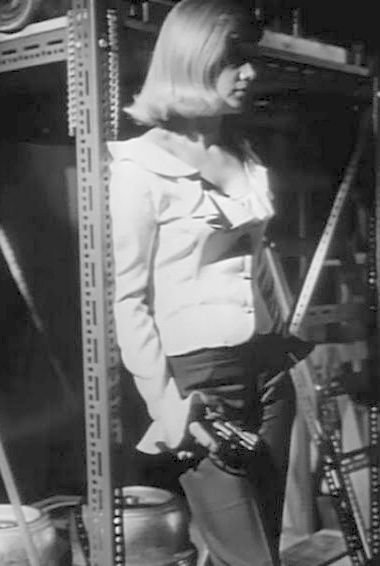 We also appreciated the parade of supporting actors, which include a significant number of familiar names, especially if you watch other shows from the era. Other names should be recognized regardless, including Kevin McCarthy, Michael J. Pollard, Richard Kiel, Joe Don Baker and Dick Clark. The music, by Joseph Mullendore, is an appropriate blast from the past, resulting in much snapping of fingers and shaking of shoulders from the GWG couch by myself and Chris. Indeed, Chris even came up with her own set of lyrics for the theme-tune, which you can find in the sidebar; we were singing lustily along with the opening credits, to the utter bemusement of our son. [The middle section is a bit tricky, and should probably only be attempted by trained professionals. We ended up going, “Raindrops on roses, and whiskers on kittens…” much of the time!]
We also appreciated the parade of supporting actors, which include a significant number of familiar names, especially if you watch other shows from the era. Other names should be recognized regardless, including Kevin McCarthy, Michael J. Pollard, Richard Kiel, Joe Don Baker and Dick Clark. The music, by Joseph Mullendore, is an appropriate blast from the past, resulting in much snapping of fingers and shaking of shoulders from the GWG couch by myself and Chris. Indeed, Chris even came up with her own set of lyrics for the theme-tune, which you can find in the sidebar; we were singing lustily along with the opening credits, to the utter bemusement of our son. [The middle section is a bit tricky, and should probably only be attempted by trained professionals. We ended up going, “Raindrops on roses, and whiskers on kittens…” much of the time!]
We have to mention Bruce, Honey’s pet ocelot. If you’re not sure what one of those is, think 30 pounds of wild feline. And, by most accounts, “wild” was the word. As Francis put it, “If a cat is happy, it bites and scratches; and if it is unhappy, it bites and scratches.” She was left bruised and in need of a tetanus shot by the end of some scenes, though Anne bore it with grace, as in the publicity pic (top left). It’s undeniably impressive to see a heroine deliver lines with impeccable aplomb, while a sizable carnivorous animal attempts to gnaw off her face. This, however, has not stopped Chris from wanting an ocelot for Christmas, I think our two geriatric dogs would object; something plush might be better for all concerned.
It’s the kind of show that, on a casual glance, is more laughable than anything – the first couple of episodes watched, we were mostly sniggering at the anachronisms and sixties stylings. But as the series wore on, that aspect ceased to be notable, and we found ourselves enjoying the relationships, snsppy repartee and characters present in the show, without any ‘ironic’ overtones. It wasn’t long before we found ourselves looking forward to watching an episode with our morning coffee, and were genuinely sorry to come to the end of the final installment.
The show initially did well enough in the ratings, making the top twenty programs, while Francis won a Golden Globe and was nominated for an Emmy, losing out to Barbara Stanwyck in The Big Valley. However, neither that nor the merchandising returns could save the show. its viewing figures were clobbered toward the end of its run by Gomer Pyle, though the decision not to renew the show for a second season was largely the result of network stinginess. As Francis remembers it, “ABC said, We can buy The Avengers cheaper than we can make Honey West. And that’s exactly what happened.” It was an ironic replacement, West being effectively “killed off” by her Transaatlantic cousin, Emma Peel.
There has been subsequent talk of a movie version, with Reese Witherspoon attached in 2001 and again in 2007, but nothing came of either project. Most recently, 7th Voyage Productions apparently bought the rights, but that was more than two years ago now, with little or no progress since. There have been a series of comics, but in a world where ABC will hand out a lot of money to botch a Charlie’s Angels remake, it’s a shame no-one has made a serious effort to reboot Honey, which in many ways is a property intrinsically better suited to the modern era.
Star: Anne Francis, John Ericson, Irene Hervey
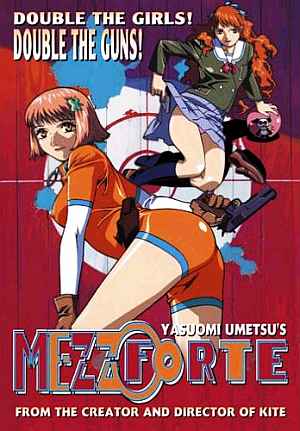 The Peach Twisters baseball team suck. This may be because the owner kills his pitcher with a baseball bat in the car-park, after losing a game? And he’s the model of restraint and sanity compared to his daughter, Momomi. The Danger Service Agency, a trio of troubleshooters, are hired to kidnap the owner (obviously, legality is a minor concern), but things go wrong, and he dies in the process. How can they escape this tricky situation? The core of the DSA is Mikura, who is a combat specialist, and easily the best thing in the group, as the other two are largely forgettable. But when Mikura goes into action, the film accelerates from 0-60 in about two seconds, which a cheerful, splattery approach that’s endearing. And she’s an upbeat character, which is a notable contrast to Umetsu’s other genre entry, Kite [Sawa, that show’s heroine, makes a cameo here].
The Peach Twisters baseball team suck. This may be because the owner kills his pitcher with a baseball bat in the car-park, after losing a game? And he’s the model of restraint and sanity compared to his daughter, Momomi. The Danger Service Agency, a trio of troubleshooters, are hired to kidnap the owner (obviously, legality is a minor concern), but things go wrong, and he dies in the process. How can they escape this tricky situation? The core of the DSA is Mikura, who is a combat specialist, and easily the best thing in the group, as the other two are largely forgettable. But when Mikura goes into action, the film accelerates from 0-60 in about two seconds, which a cheerful, splattery approach that’s endearing. And she’s an upbeat character, which is a notable contrast to Umetsu’s other genre entry, Kite [Sawa, that show’s heroine, makes a cameo here].




 ★★★★
★★★★
 Honey West’s significance in television history can’t be exaggerated. She was the first ever woman detective to be the central character in an American network series, and was arguably the medium’s first action-heroine. Even though it ran for just one season, it helped open the doors for those who followed, such as The Girl from U.N.C.L.E., Get Christie Love and Police Woman. The show was based on a series of books by husband-and-wife team Gloria and Forrest Fickling, writing as “G.G.Fickling”. Beginning in 1957 with This Girl For Hire, eleven novels were produced over the next half-decade, and noted producer Aaron Spelling bought the rights and turned it into a TV series, originally spinning off from Burke’s Law [Gloria Fickling states they were largely screwed over by Spelling, getting little beyond a credit].
Honey West’s significance in television history can’t be exaggerated. She was the first ever woman detective to be the central character in an American network series, and was arguably the medium’s first action-heroine. Even though it ran for just one season, it helped open the doors for those who followed, such as The Girl from U.N.C.L.E., Get Christie Love and Police Woman. The show was based on a series of books by husband-and-wife team Gloria and Forrest Fickling, writing as “G.G.Fickling”. Beginning in 1957 with This Girl For Hire, eleven novels were produced over the next half-decade, and noted producer Aaron Spelling bought the rights and turned it into a TV series, originally spinning off from Burke’s Law [Gloria Fickling states they were largely screwed over by Spelling, getting little beyond a credit]. We also appreciated the parade of supporting actors, which include a significant number of familiar names, especially if you watch other shows from the era. Other names should be recognized regardless, including Kevin McCarthy, Michael J. Pollard, Richard Kiel, Joe Don Baker and Dick Clark. The music, by Joseph Mullendore, is an appropriate blast from the past, resulting in much snapping of fingers and shaking of shoulders from the GWG couch by myself and Chris. Indeed, Chris even came up with her own set of lyrics for the theme-tune, which you can find in the sidebar; we were singing lustily along with the opening credits, to the utter bemusement of our son. [The middle section is a bit tricky, and should probably only be attempted by trained professionals. We ended up going, “Raindrops on roses, and whiskers on kittens…” much of the time!]
We also appreciated the parade of supporting actors, which include a significant number of familiar names, especially if you watch other shows from the era. Other names should be recognized regardless, including Kevin McCarthy, Michael J. Pollard, Richard Kiel, Joe Don Baker and Dick Clark. The music, by Joseph Mullendore, is an appropriate blast from the past, resulting in much snapping of fingers and shaking of shoulders from the GWG couch by myself and Chris. Indeed, Chris even came up with her own set of lyrics for the theme-tune, which you can find in the sidebar; we were singing lustily along with the opening credits, to the utter bemusement of our son. [The middle section is a bit tricky, and should probably only be attempted by trained professionals. We ended up going, “Raindrops on roses, and whiskers on kittens…” much of the time!]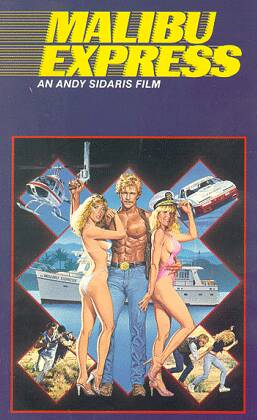 Female action fans would be well advised to give this a wide berth. Actually, so should everyone else, unless they’re fans of crass sexism, extremely clunky exposition and hideous country & western. Cody Abilene (Hinton) is a PI hired by Countess Luciana (Danning) to look into the export of illegal computer technology to the Russians, centred on the home of Lady Lillian Chamberlain. Who is responsible? Oversexed chauffeur Shane? Daughters Lisa and Anita? Or the maid, Marion? [groan…]
Female action fans would be well advised to give this a wide berth. Actually, so should everyone else, unless they’re fans of crass sexism, extremely clunky exposition and hideous country & western. Cody Abilene (Hinton) is a PI hired by Countess Luciana (Danning) to look into the export of illegal computer technology to the Russians, centred on the home of Lady Lillian Chamberlain. Who is responsible? Oversexed chauffeur Shane? Daughters Lisa and Anita? Or the maid, Marion? [groan…]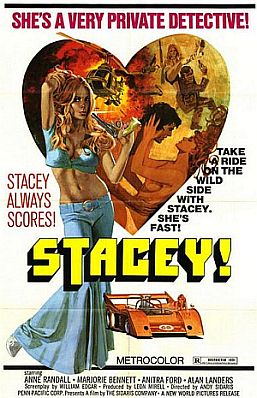 While this wasn’t Sidaris’s first feature – he’d done The Racing Scene, with James Garner in 1967 – this was likely the prototype of the BB&B (Blood, Bullets & Babes) flicks that would become his trademark. If all the elements do not quite mesh in the way they eventually would, they are all present, mostly in the shape of Anne Randall, a former Playboy playmate who plays private investigator Stacey, and looks a bit like Heather Graham.
While this wasn’t Sidaris’s first feature – he’d done The Racing Scene, with James Garner in 1967 – this was likely the prototype of the BB&B (Blood, Bullets & Babes) flicks that would become his trademark. If all the elements do not quite mesh in the way they eventually would, they are all present, mostly in the shape of Anne Randall, a former Playboy playmate who plays private investigator Stacey, and looks a bit like Heather Graham.